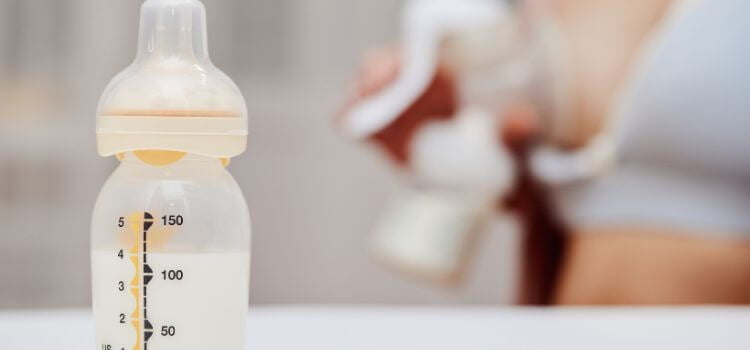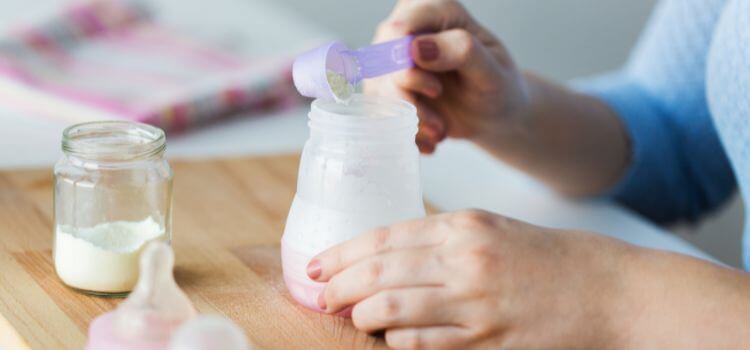
Why is my baby squirming while bottle feeding? It’s a question that often leaves parents feeling both curious and concerned. As you embark on this journey of parenthood, understanding the intricacies of your baby’s behavior during feeding is key to fostering a harmonious and enjoyable experience for both you and your little one.
In this exploration, we’ll delve into the reasons behind the adorable yet sometimes perplexing phenomenon of a squirming baby during bottle feeding.
Join us as we uncover the clues, address common concerns, and offer insights that empower you to create a feeding environment that suits your baby’s unique needs. Let’s navigate the twists and turns of this feeding adventure together, one bottle at a time.
Common Reasons for Squirming
Hunger Cues: Ensuring Satisfaction
Babies communicate through cues, and squirming might signal lingering hunger or an inadequate milk flow. Recognizing these cues ensures your baby feels satisfied after each feeding session.
Discomfort or Pain: Addressing Physical Unease
Uncomfortable positions, tight clothing, or physical discomfort can lead to squirming. Ensure your baby’s comfort by creating a cozy feeding environment.
Overstimulation: Calming the Senses
Babies are sensitive to their surroundings. Overstimulation from noise, lights, or excessive handling can result in squirming. Learn to create a calm, soothing atmosphere for feeding.
Need for a Burp: Ensuring Digestive Comfort
Squirming may indicate the need for a burp. Learn effective burping techniques to alleviate discomfort and promote smoother feeding.
Proper Bottle-Feeding Techniques

Choosing the Right Bottle and Nipple: Personalized Comfort
Selecting a bottle and nipple that suit your baby’s preferences can make a significant difference in their feeding experience, minimizing squirming.
Ensuring the Correct Milk Flow: Adjusting to Needs
Adjusting the milk flow according to your baby’s age and needs prevents frustration and encourages a seamless feeding process.
Maintaining a Comfortable Feeding Position: Promoting Relaxation
Position your baby comfortably during feeding to promote relaxation and reduce the likelihood of squirming.
Being Attentive to Baby’s Cues: Responsive Parenting
Stay attuned to your baby’s signals, adapting to their needs in real time. This responsive approach fosters a positive feeding dynamic.
Signs of Allergies or Sensitivities
Recognizing Symptoms: Vigilance for Well-being
Squirming accompanied by other symptoms may indicate allergies or sensitivities. Be vigilant and consult a pediatrician for guidance.
Seeking Medical Advice: Timely Intervention
If concerns about allergies arise, prompt consultation with a pediatrician is crucial for proper diagnosis and appropriate measures.
Creating a Calm Feeding Environment

Minimizing Distractions: Focused Feeding
A peaceful environment minimizes distractions, contributing to a more focused and enjoyable feeding session.
Using Soothing Techniques: Creating Serenity
Incorporate soothing techniques, such as gentle music or a soft blanket, to create a calming atmosphere during feedings.
Establishing a Feeding Routine: Predictability and Comfort
Consistency in feeding times and routines provides a sense of predictability, reducing anxiety and squirming.
Addressing Overstimulation
Limiting External Stimuli: Creating a Serene Setting
Control your baby’s exposure to external stimuli during feeding to prevent overstimulation and encourage a relaxed feeding experience.
Calming Techniques for an Overstimulated Baby: Gentle Soothing
Implement calming techniques like swaddling or gentle rocking to ease an overstimulated baby before and during feeding.
Baby Pushing the Bottle Away but Still Hungry: Unraveling Hunger Cues
Have you noticed your baby pushing the bottle away despite seeming hungry? This behavior can be attributed to various factors. Your baby might be signaling that they need a break or a burp during the feeding session.
It’s also possible that they are not satisfied with the milk flow or that something else is causing discomfort. Experiment with different bottle nipples and feeding positions to find what suits your baby best. Pay attention to cues like lip-smacking or continued rooting, as these may indicate lingering hunger.
Why Does My Baby Squirm So Much While Eating: Exploring Restlessness
Is your baby constantly squirming during meals? Restlessness during feeding is a common behavior that can be caused by a range of factors. It might indicate that your baby is still getting used to the feeding routine, or they might be overstimulated by their surroundings.

Creating a calm and quiet feeding environment can help minimize squirming. Additionally, ensure that your baby is comfortably positioned and not experiencing any physical discomfort, such as tight clothing.
Baby Crying During Feeding Formula: Addressing Formula Feeding Concerns
Are you facing tears during formula feeding sessions? Crying during feeding can be distressing for both you and your baby. It’s essential to rule out potential issues, such as the formula being too hot or too cold.
Check the formula’s temperature and ensure that the nipple flow matches your baby’s developmental stage. If crying persists, consult with your pediatrician to rule out allergies or sensitivities.
Why Is My Baby Squirming While Bottle Feeding Forum: Seeking Parental Insights
Have you been seeking advice in parenting forums regarding your baby’s constant wriggling? Joining parenting forums can be an invaluable source of shared experience and gain insights from fellow parents experiencing similar struggles.
Parents who participate can exchange soothing techniques, bottle choices, and feeding positions that worked for them while networking and networking can also give insight.
Every child is unique, and engaging with these forums may offer support as you find what works for your particular case. Engaging provides community and support!
Baby Fussy During Feeding Bottle 2 Months: Navigating the 2-Month Mark
Experiencing fussiness at the two-month mark? Around this time, babies may go through growth spurts or developmental changes, affecting their feeding behavior.
It’s crucial to be patient and responsive to your baby’s cues. Ensure a comfortable feeding environment, experiment with different bottle options, and consider paced bottle feeding to match your baby’s pace.
Why Is My Baby Spilling Milk While Bottle-Feeding: Tackling Milk Spillage
Is milk spillage a common issue during bottle feeding? Spillage can occur due to a variety of reasons, such as a fast milk flow or an incorrect bottle nipple.
Choose a nipple that matches your baby’s age and developmental stage, and hold the bottle at a slight angle to control the flow. Taking breaks during feeds can also reduce the likelihood of spillage.
Why Is My Baby Squirming While Breastfeeding: Navigating Breastfeeding Challenges
Encountering squirming during breastfeeding sessions? This behavior could be a result of various factors, including latch issues, an improper breastfeeding position, or an overactive letdown.
Experiment with different positions, ensure a proper latch and consider seeking advice from a lactation consultant to address any breastfeeding challenges.
Conclusion: Celebrating Your Baby’s Uniqueness
In conclusion, a squirming baby during bottle feeding is a normal part of parenthood. By understanding the reasons behind this behavior and implementing effective techniques, you can create a positive and enjoyable feeding experience for both you and your little one.
FAQs: Why Is My Baby Squirming While Bottle Feeding?
Is it normal for babies to squirm during bottle feeding?
Yes, babies often squirm due to various reasons like hunger, discomfort, or overstimulation. Understanding and addressing these factors can help ease the squirming.
How can I tell if my baby is still hungry during feeding?
Watch for cues like lip-smacking, rooting, or continued sucking motions after finishing the bottle. These may indicate lingering hunger.
What are the signs of allergies in babies during feeding?
Allergy signs may include fussiness, rashes, or changes in bowel movements. If you suspect allergies, consult your pediatrician.
How often should I burp my baby during bottle feeding?
Burp your baby every 2-3 ounces during feeding and once more at the end. Adjust as needed based on your baby’s cues.
When should I seek medical advice for my baby’s squirming?
If squirming is persistent or accompanied by concerning symptoms, consult your pediatrician promptly to rule out underlying medical issues.

Pingback: What to Do With Old Baby Bottles - Parenting and Baby Care
Pingback: Can you bottle-feed the baby in a car seat?
Pingback: How to Dry Baby Bottles Quickly and Efficient Tips
Pingback: 10 Best Bottles for Oatmeal Cereal Baby
cialis 5mg no perscription
tadalafil soft gel capsule 20mg
tadalafil troche (lozenge) where to buy
oxycodone pharmacy locator
usa pharmacy
viagra 50 mg for sale
where to buy sildenafil usa
best time to take cialis
tadalafil raw dissovable
does anyone make losartan besides cozaar
citalopram vs paroxetine
ddavp and bleeding disorders
how does depakote work
hydrochlorothiazide with cozaar
citalopram vs wellbutrin
ddavp before surgery
tamsulosin and cataract operation
can i take ibuprofen with tizanidine